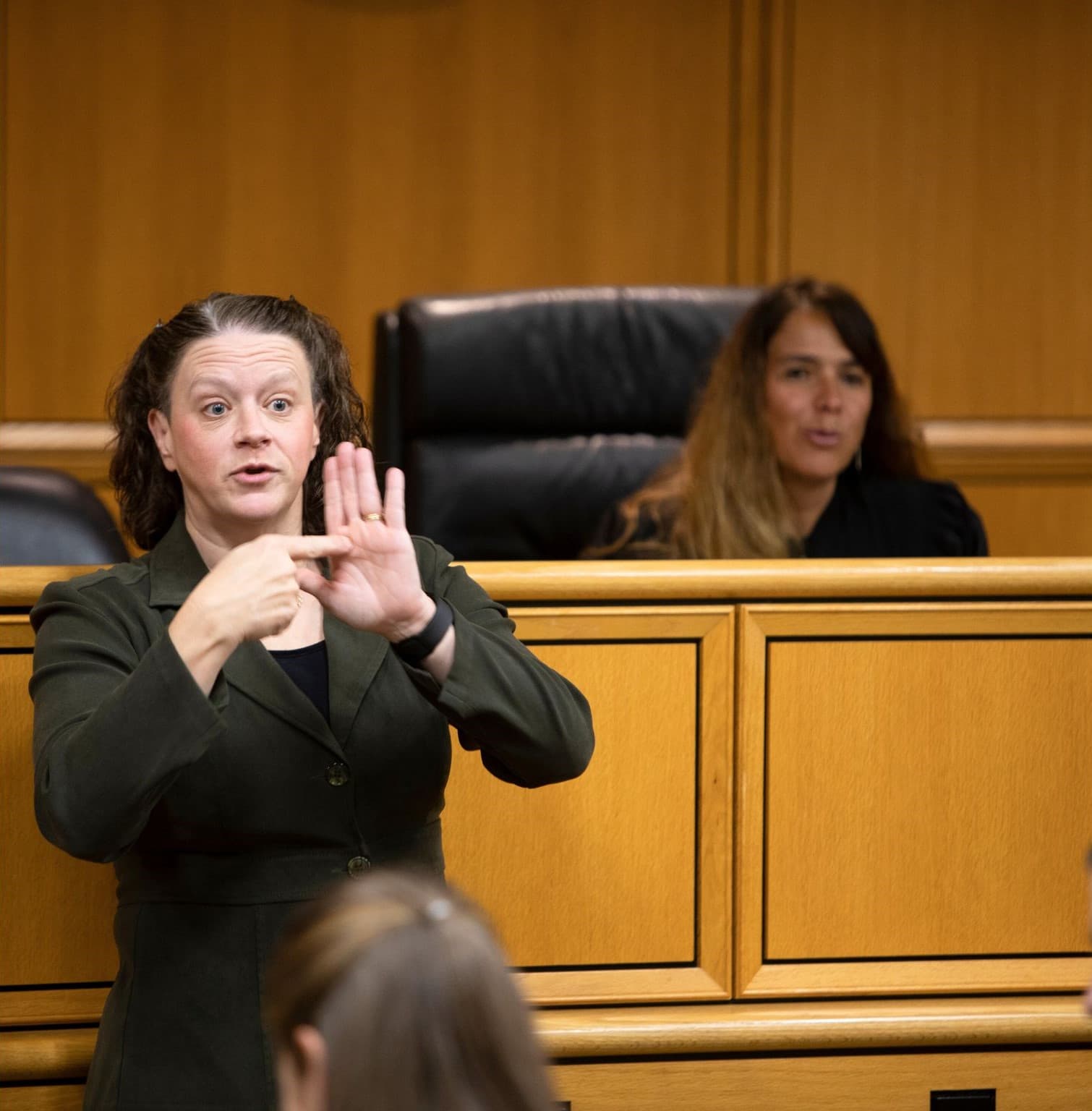Unlocking Accessibility:
Your Partner for Inclusive Legal Services and Settings

At Inclusive Communication Services, we understand the importance of clear and accessible communication in the legal world.
Whether you’re setting up a deposition, hosting a legal seminar, or preparing for court, we’re here to ensure that everyone, including Deaf, DeafBlind, hard-of-hearing, and non-English speaking individuals, is fully involved and understood.
By integrating accessibility services into your law firm, police station, or courtroom, you’re sending a powerful message that you’re committed to creating an environment where every client, community member, and colleague has equal access to justice and feels supported and included in the legal process.
A Diverse Audience Deserves Inclusive Access
Today’s interconnected legal landscape involves diverse clients and professionals, including Deaf, DeafBlind, hard-of-hearing, and non-English speaking individuals, in a variety of potential roles.
Accessibility accommodations are essential to ensure that everyone can access and participate in legal proceedings, consultations, depositions, and interviews.
Only a qualified team of accessibility professionals can ensure equal access and inclusion across a variety of legal settings, including law firms, courtrooms, and police precincts.
Inclusive Communication Services ensures that Deaf, DeafBlind, hard-of-hearing, and non-English speaking individuals can fully and confidently participate in all legal experiences and interactions.
Proactive Solutions for Inclusive Legal Settings
The Inclusive Experience:
Your Dedicated Accessibility Coordinator for Legal Settings
Creating an inclusive legal setting goes beyond just meeting standard requirements—it’s about providing exceptional experiences tailored to your unique audience.
At the core of our “inclusive experience” is a dedicated accessibility coordinator available around the clock to address your legal accessibility needs, including schedule changes or other issues that may come up during your legal proceedings, meetings, or depositions.
Consider your coordinator an extension of your existing legal team, offering professional advice and equal-access solutions to ensure a truly inclusive experience. Your coordinator is on hand to join preparation meetings, client consultations, and police interviews to ensure equal access and compliance with the Americans with Disabilities Act(ADA).
Choosing Inclusive Communication Services isn’t just about ensuring accessibility; it’s about transforming your environment into a space where every individual’s legal journey is respected and supported.
Inclusive Communication Services:
The Gold Standard in Legal Accessibility Services
When it comes to legal situations where words carry significant, real-world consequences, the right partner can make all the difference. That’s why it’s important to choose a community-based organization with a proven track record of providing high-quality, reliable, and reputable services.
Discover why law offices, courts, and legal event planners consistently choose Inclusive Communication Services for their accessibility needs:
Committing to the communication needs of your diverse clients and professionals not only showcases your dedication to inclusivity, but also complies with the Americans with Disabilities Act (ADA). With Inclusive Communication Services, you’re not just ensuring accessibility; you’re emphasizing your commitment to diversity, equity, and inclusion.
In today’s interconnected legal landscape, legal professionals interact with individuals of varied backgrounds and abilities. We don’t just accommodate; we elevate accessibility, ensuring every participant feels heard and supported. Here’s how we seamlessly integrate accessibility into courtrooms, legal practices, and police precincts:
At Inclusive Communication Services, we uphold the highest standards of confidentiality and nondisclosure through every stage of your legal proceedings.
Our trained accessibility professionals, bound by a strict nondisclosure agreement (NDA) and a rigorous code of conduct, ensure the privacy of all client communications, case details, and discussions.
This dedication to confidentiality and privacy covers all aspects of the legal journey, from preliminary consultations to actual proceedings and post-event follow-ups, maintaining the utmost discretion and adhering to all relevant legal and ethical standards.
Your peace of mind is our priority.
Tips for an Exceptionally Inclusive Legal Environment
-
- Early Scheduling: Request a legal interpreter or captioner as soon as a legal event is scheduled to allow Inclusive Communication Services to secure the most qualified professional for your needs.
- Detailed Requests: Provide comprehensive details about the legal event, including participant roles, expected duration, sensitive topics that may arise, and any relevant documents to allow for better preparation.
- Arrivals and Clearances: Accessibility teams will arrive 10-30 minutes prior to the scheduled start time. Ensure that parking and other necessary clearances are secured for hassle-free entry to your location.
- Documents: Provide relevant documents to interpreters and captioners in advance to ensure the interpreter has ample time to prepare for your event. Submit documents that require legal translation to your coordinator prior to the event.
- Sign Language Interpreter Placement Position interpreters strategically in meetings and courtrooms to ensure a clear line of sight to all participants. Avoid placing interpreters in front of a bright background to ensure Deaf or hard-of-hearing individuals can see the interpreter clearly.
- Video and Audio Media Use: Ensure video or audio media have captions or notify the interpreter in advance if captions are not available. Ensure the interpreter is well-lit if lights will be dimmed during a presentation. Submit un-captioned media content early to allow time for captioning.
- Clear Communication: Encourage participants to speak clearly and one at a time. Face Deaf or hard-of-hearing individuals directly when speaking to them. Repeat and clarify any out of sight comments for Deaf or hard-of-hearing participants. Be patient when waiting for responses.
- Consider a Deaf Interpreter (DI / CDI): For complex legal situations, needs, or languages, consider a Deaf Interpreter (DI / CDI) to enhance accuracy and understanding of concepts and messages.
- Direct Engagement: Directly engage with Deaf, DeafBlind, hard-of-hearing, and non-English speaking participants, not the interpreter. There is no need to introduce the interpreter unless specifically requested
- Requests for Extensions: Respect the interpreters’ and captioners’ scheduled end-time. Communicate with your designated accessibility coordinator if you need to extend services so that they can make the necessary arrangements.
- Confidentiality: Respect and trust the ICS accessibility provider’s strict code of conduct and commitment to confidentiality. Avoid asking them to disclose prior information, even after a case is closed.
- Accessibility Coordinator Contact: Reach out to your accessibility coordinator if you have questions, need assistance with preparations for your service request, or need advice on best practices
Following these guidelines will help to create an inclusive healthcare environment for all patients and professionals!
Inclusive Communication Services makes inclusivity effortless, transforming courtrooms, legal proceedings, and meetings into spaces where everyone’s voice is heard and valued.
Let’s work together to create legal environments that set the standard for accessibility.
Contact us today to discuss your needs and start planning inclusive legal experiences that ensure equal access to justice and legal support for all.

Ready to enhance the accessibility of your law firm, courtroom, or legal events?
Let’s start planning your accessible legal experience today!
Need a professional interpreter, translator, or captioner?
Making ADA accommodations simple and inclusive!
We are here to help you!




